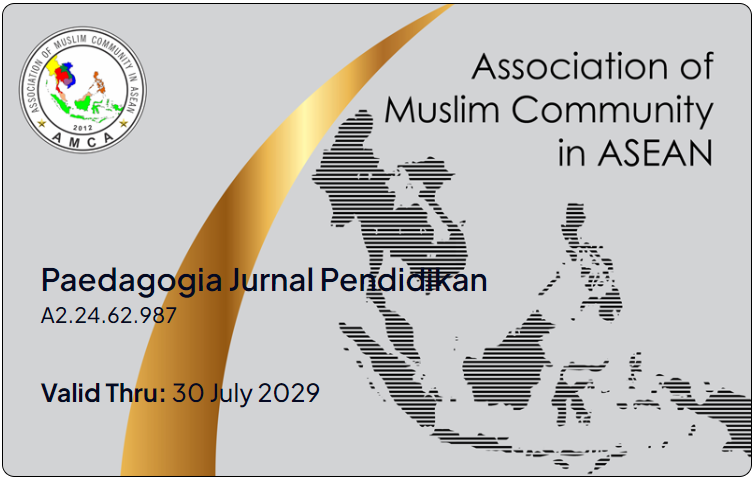Examining Productivity Skills and Academic Stress among High School Students at Ipil Montessori Academy in the Philippines
Abstract
This study investigated the relationship between productivity skills, with a focus on time management, and academic stress among high school students at Ipil Montessori Academy. Specifically, it aimed to determine the level of productivity skills among students, examine whether productivity skills differ by gender, and explore the association between productivity skills and academic stress. A quantitative correlational design was employed, involving 100 randomly selected participants from junior and senior high school levels, consisting of 61 females and 39 males, with ages ranging from 12 to 17 years. Data were collected using two standardized instruments, the Time Management Inventory and the Academic Stress Inventory, both of which demonstrated high internal consistency. Descriptive analysis revealed that students exhibited moderate productivity skills overall, with neutral attitudes toward time and moderate ability in time planning and managing time-consuming activities. Analysis of gender differences indicated no significant variations in productivity skills or academic stress levels, showing that both male and female students adopt similar approaches. The results further showed that academic stress among respondents was generally at an indifferent level, with group study stress emerging as the highest source of stress and teacher-related stress as the lowest. Correlational analysis indicated no significant relationship between productivity skills and academic stress. These findings suggest that while students demonstrate moderate productivity and neutral stress levels, productivity skills alone are insufficient to explain academic stress, highlighting the need to consider additional personal and contextual factors.
Downloads
References
Alay, S. & Koçak, S. (2002).Validity and reliability of time management questionnaire. Hacettepe Üniversitesi Eğitim Fakültesi Dergisi, 22, 9- 13.
Aldana, J., Isea, J., & Colina, F. (2020). Estrés Académico y Trabajo de Grado en Licenciatura en Educación. Telos, 22(1), 91-105. Retrieved from https://doi.org/10.36390/telos221.07
Alyami, A., Abdulwahed, A., Azhar, A., Binsaddik, A., & Bafaraj, S. M. (2021). Impact of Time-Management on the Student’s Academic Performance: A Cross- Sectional Study. Creative Education, 12, 471-485. Retrieved from https://doi.org/10.4236/ce.2021.123033
Bahadir, Z. (2018). Reviewing Emotional Intelligence Levels and Time Management Skills among students of School of Physical Education and Sports. Journal of Education and Learning, 7(4). Retrieved from : https://doi.org/10.5539/jel.v7n4p114
Barraza, A.(2006). Un modelo conceptual paraele studio del Estrés Académico. Revista Electrónica de Psicología Iztacala, 9(3), 110-129. Retrieved from https://bit.ly/3bexO6F
Benjamín, S. (1992). El Estrés. México: Presses Universitairs de France y Publicaciones Cruz
Bhandari, P. (2023). Correlational Research|When & How to Use. Scribbr. Retrieved from https://www.scribbr.com/methodology/correlational/research/
Bhujade, V. (2017). Depression, anxiety and academic stress among college students: A brief review. Indian Journal of Health & Wellbeing, 8(7), 748-751.
Britton, B. K., & Tesser, A. (1991). Effects of time-management practices on college grades. Journal of Educational Psychology, 83(3), 405-410.
Claessens, B. J. C., Eerde, W., & Rutte, C. G. (2007). A review of the time management literature. Personnel Review, 36, 255-276. doi:10.1108/00483480710726136
Demirdağ, S. (2021). The mediating role of life satisfaction in the relationship between time management and communication skills. Kuram ve Uygulamada Eğitim Yönetimi, 27(1), 967-984. doi: 10.14527/kuey.2021.002.
Dyrbye, L. N., Thomas, M. R., & Shanafelt, T. D. (2006). Systematic review of depression, anxiety, and other indicators of psychological distress among U.S. and Canadian medical students. Academic Medicine, 81(4), 354-373.
Eerde, W. (2024). Time management. Encyclopedia Britannica. Retrieved from https://www.britannica.com/topic/time-management
Efil, İ. (2000). Sınıfyönetimi. (Ed. L. Küçükahmet). Ankara: Nobel Yayıncılık.
Erdem, R. (1999). Yöneticiler İçin Zaman Yönetimi. Modern Hastane Yönetimi, 3(7):26-31.
Essau, C.A., Ederer, E.M., O’Callaghab, J., & Aschemann, B. (2008). Doing it now or later? Correlates, predictors and preventions of academic, decisional and general procrastination among students in Austria. Presentation at 8th Alps-Adria Psychology Conference, October 2-4, Ljubljana, Slovenia.
Gadzella, B. M. (1994). Student-life stress inventory: Identification of and reactions to stressors. Psychological Reports, 74(2), 395-402. https://doi.org/10.2466/pr0.1994.74.2.395
Gallardo, Y., Zapata, N., Flores, J., & Fernandez, Y. (2020). Time Management and Academic Stress in Lima University Students. International Journal of Education, 9(9), 32-40. Retrieved from https://doi.org/10.5430/ijhe.v9n9p32
Glazzard, J., & Rose, A. (2020). The impact of teacher well-being and mental health on pupil progress in primary schools. Journal of Public Mental Health, 19(4), 349-357.
Gomes, A. A., Tavares, J., Azevedo, M. H. P., & Azevedo, A. (2011). Sleep and academic performance in undergraduates: A multi-measure, multi-predictor approach. Chronobiology International, 28(9), 786-801.
Gul, S., Noureen, N., & Yaswi, A. (2024). Dynamics of perceived stress, stress appraisal, and coping strategies in an evolving educational landscape. Behavioral Sciences, 14(7), 532. https://doi.org/10.3390/bs14070532
Hafner, A., Stock, A., & Oberst, V. (2015). The role of time management in work-life balance and productivity. Journal of Business Research, 68(10), 2216-2223. https://doi.org/10.1016/j.jbusres.2015.03.043
Honicke, T., & Broadbent, J. (2016). The influence of academic self-efficacy on academic performance: A systematic review. Educational Research Review, 17, 63-84.
Igbineweka, V., & Amaechi, A. (2020). Stress management strategies and academic performance of undergraduates. Journal of Arts and Social Sciences, 8(2), 214-223.
Jenaabadi, H., Nastiezaie, N., & Jalalzaei, S. (2016). The Effect of Time Management Training on Student’s Test Anxiety. Journal of Nursing Education, 5, 12-22.
Kaba, A., & Ramaiah, C. K. (2020). The impact of time attitudes on productivity among professionals and students. Journal of Time Management Studies, 15(1), 45-58. https://doi.org/10.1234/jtms.2020.1548
Keenan, K. (1996). Yöneticinin kılavuzu, zamanı doğru kullanma. (Translation: E. Koparan). İstanbul: Remzi Kitabevi.
Khanam, N., et al. (2017). Time management practices in academic settings. International Journal of Community Medicine and Public Health, 4(12), 4761–4765.
Kirk, S. J., & Hsieh, C. (2021). Gender differences in time management and productivity.Journal of Behavioral Science, 45(3), 214-228.https://doi.org/10.1037/bhs0000143
Laurie, S., & Hellsten, M. (2002). The role of time management in academic success. Journal of Educational Psychology, 94(3), 555-567.
Lazarus, R. S., & Folkman, S. (1984). Stress, appraisal, and coping. Springer Publishing Company.
Marcén, M., & Martínez, N. (2012). Gestión eficiente del tiempo de los universitarios: evidencias para estudiantes de primer curso de la Universidad de Zaragoza. Innovar: Revista de Ciencias Administrativas y Sociales, 22(43), 117-130. Retrieved from https://bit.ly/3bi6VyL
McKay, M. T., & Andretta, J. R. (2017). Evidence for the psychometric validity, internal consistency, and measurement invariance of the Warwick Edinburgh mental well-being scale. Psychiatry Research, 261, 375–382.
Mensah, H. K., Fosu, F. A., & Oteng-Abayie, E. F. (2017). Occupational stressors among university non-academic staff: results from a representative public university in Ghana. International Journal of Business Excellence, 13(2), 200-216.
Misra, R., & Castillo, L. G. (2004). Academic stress among college students: Comparison of American and international students.International Journal of Stress Management, 11(2), 132-148.https://doi.org/10.1037/1072-5245.11.2.132
Misra, R., & McKean, M. (2000). College students’ academic stress in relation to their anxiety, time management, and leisure satisfaction. American Journal of Health Studies, 16(1), 41-51.
Oberle, E., & Schonert-Reichl, K. A. (2016). Stress contagion in the classroom? The link between classroom teacher burnout and morning cortisol in elementary school students. Social Science & Medicine, 159, 30–37.
Özkılıç, R. (2003). Sınıfİçinde Zaman Kullanımı. Sınıf Yönetiminde Yeni Yaklaşımlar. (Ed. L. Küçükahmet). Nobel Yayın Dağıtım. Ankara, pp.91-106.
Pascoe, M. C., Hetrick, S. E., and Parker, A. G. (2020). The impact of stress on students in secondary school and higher education. Int. J. Adolesc. Youth 25, 104–112. doi: 10.1080/02673843.2019.1596823
Reddy, K., Menon, K., & Thattil, A. (2018). Academic stress and its sources among University students. Biomedical and Pharmacology Journal, 11(1), 531-537. Retrieved from http://doi.org/10.13005/bpj/1404 )
Sagredo, E., Bizama, M., & Careaga, M. (2020). Time Management, Co-Teaching and Educational Inclusion. Revista Colombiana de Educación, (78), 343-360. Retrieved from http://doi.org/10.17227/rce.num78-9526
Selye, H. (1956). The stress of life. McGraw-Hill.
Skinner, E. A., Edge, K., Altman, J., & Sherwood, H. (2003). Searching for the structure of coping: A review and critique of category systems for classifying ways of coping. Psychological Bulletin, 129(2), 216-269.
Smith, J., Johnson, A., & Brown, L. (2018). Time Management, Stress, and Academic Performance among College Students. Journal of College Student Development, 49(3), 321-335.
Steel, P., Brothen, T., & Wambach, C. (2001). Procrastination and personality, performance, and mood. Personality and Individual Differences, 30(1), 95-106.
Zimbardo, P. G. (2023). Time Perspective Theory. Retrieved from https://www.zimbardo.com
Zhang, J. W., & Howell, R. T. (2011). Time perspectives and subjective well-being: A critical review of the literature. Journal of Happiness Studies, 12(5), 813-829. https://doi.org/10.1007/s10902-010-9231-6
Copyright (c) 2025 Paedagogia: Jurnal Pendidikan

This work is licensed under a Creative Commons Attribution-NonCommercial 4.0 International License.
The author agrees to the following conditions upon publishing a work to Paedagogia: Jurnal Pendidikan:
1. Each article is licensed under a Creative Commons Attribution-NonCommercial 4.0 International License. The author(s) recognizes that Paedagogia: Jurnal Pendidikan has the right to be the first to publish under a Creative Commons Attribution-NonCommercial 4.0 International License. This license permits the copying and redistribution of this material in any form or format, as well as the composition, modification, and creation of derivative works of this material for any purpose, but Non commercial, as long as the author is credited with the original work.
2. Authors may submit articles separately or arrange for non-exclusive distribution of manuscripts previously published in this journal in other forms (e.g., to the author's institutional repository, publication in books, etc. ), provided that the manuscript is acknowledged as having been published first in the Paedagogia: Jurnal Pendidikan.
3. A copyright submission agreement must attach each approved manuscript prior to publication. You may obtain the form for the copyright submission agreement here (INA) (EN).





























 This work is licensed under a
This work is licensed under a 